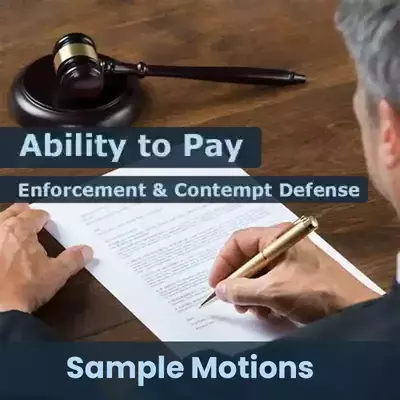The department of justice agrees that parents and children are not being served justice in the family courts, that parents should not be put into debtor's prisons, that unlawful and harmful practices were taking place, and that their constitutional rights are being violated. They suggested that family law reform take place. While this letter provides “greater clarity to state and local courts regarding their legal obligations with respect to fines and fees” they did not provide guidance regarding their legal obligations with respect to your fundamental parental rights and your child's rights.
This letter comes right on the brink of Ron and Sherry Palmer awaiting a ruling on the federal lawsuit regarding these fundamental rights and on the release of new breakthrough motions to help you make these same arguments right now in your trial courts. Many appellate court opinions state that the reason that they cannot rule on these rights is because they are not being raised in the trial courts.
Ron and Sherry Palmer have made it one of their main focuses to stop family courts from abusing parents and their children after the family courts hurt their family and children. They discovered that everyone who worked in the family court process ignored the constitution and all of the protections that the constitution provides people faced with the threat of abuse of power. The AG's most recent letter to the courts not only exposed this truth but also demands that the family courts adopt some best practices and clean up their act! The only problems is that this AG letter only addresses fines and fees. Just as the AG's letter states that the required guiding principles that they list for the court's to follow are grounded in “the rights to due process and equal protection,” so too are the materials that the Palmers have been producing since 2013 here at www.fixfamilycourts.com.
Following the Palmer's #1 parental rights book, “NOT in The Child's Best Interest” published in May of 2013 now comes the breakthrough series of Motions and Petition arguments that bring overdue clarity regarding the state and local courts regarding their legal obligations with respect to your fundamental constitutionally protected parental rights and child's rights. The AG agrees that “constitutional principles” are relevant in family courts. And that parents have “rights to due process and equal protection.” These motions show you how to demand specific protection of your specific rights to proper due process and equal protection.
Family court practices threaten yours and your child's health and well being. You will want these arguments to protect yourself and your family from these harmful practices going unchallenged. We all know what you get today when you don't challenge unrestrained power in these courts: bankruptcy, financial rape, debtor's prisons, parental alienation, mental anguish, loss of rights, and children being used for money! TAKE ME TO THESE MOTIONS.
These motions that are available to help you fight this now are:
- Equal Protection Motion
- Due Process: Substantive Rights Motion
- Due Process: Procedural Protection Motion
- Petition add ins
The Attorney General published the following guidelines for protecting individuals from illegal practices regarding collection of alimony and child support:
“To help judicial actors protect individuals’ rights and avoid unnecessary harm, we discuss below a set of basic constitutional principles relevant to the enforcement of fines and fees. These principles, grounded in the rights to due process and equal protection, require the following: (1) Courts must not incarcerate a person for nonpayment of fines or fees without first conducting an indigency determination and establishing that the failure to pay was willful; (2) Courts must consider alternatives to incarceration for indigent defendants unable to pay fines and fees; (3) Courts must not condition access to a judicial hearing on the prepayment of fines or fees; (4) Courts must provide meaningful notice and, in appropriate cases, counsel, when enforcing fines and fees; (5) Courts must not use arrest warrants or license suspensions as a means of coercing the payment of court debt when individuals have not been afforded constitutionally adequate procedural protections; (6) Courts must not employ bail or bond practices that cause indigent defendants to remain incarcerated solely because they cannot afford to pay for their release; and (7) Courts must safeguard against unconstitutional practices by court staff and private contractors.”
The Motions and Petition add in arguments help you fight having these orders made in the first place. The solution, according to the Palmers, is not in just correcting the enforcement practices with the fines and fees, but in correcting the abuse of power and abuse of discretion practices that are allowing the courts to make the unjust orders in the first place. That is what these motions offer you. TAKE ME TO THE MOTION PAGE.
The Palmers also have free webinars to help you get started with understanding how these motions help you. And if you need more help from there, they have paid webinars that provide you with online class-like instruction to help you understand how to argue these motions orally and to defend these filings.
Click here to get the DOJ letter to the courts. UPDATE: Under the Trump Administration, the DOJ has rescinded and repealed this letter as of July 3, 2018. “In February 2017, President Donald Trump issued Executive Order 13777, which calls for agencies to establish Regulatory Reform Task Forces, chaired by a Regulatory Reform Officer, to identify existing regulations for potential repeal, replacement, or modification. The Department of Justice Task Force is chaired by Acting Associate Attorney General Jesse Panuccio. . . . The Task Force identified 25 guidance documents for repeal in December 2017 and has identified 24 more documents to repeal this month.” This letter unfortunately was one that was removed.



























